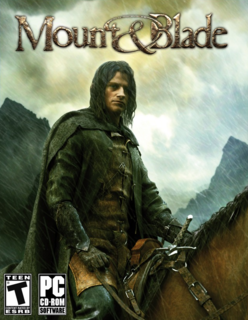In medieval-styled fantasy games, the characters wield swords and bows but it often feels like they could be fighting with nearly any weapon. In Mount & Blade, developer TaleWorlds Entertainment makes it clear that you are in armor, holding a sword, and riding a horse. Objects have weight and no words are wasted. Yet for all the action, an intriguing web of relationships gives the game its long term appeal. The roleplaying genre standard of choosing between being the hero or the villain becomes irrelevant in the face of carefully crafted systems.
There is little in the way of context in the world of Calradia. The player creates a character, chooses a background for him or her, and is promptly dropped in the middle of the map. Fittingly, the closest landmark is a training ground, as the core of Mount & Blade is its combat. It's a fair tutorial, allowing the user to either learn what they want or skip straight to the game and learn on the fly.
Assuming you do choose to get some pointers, the first lesson likely to be learned is that blades rarely dance around the screen like they do in more stylized games. Each strike must be calculated and requires aiming. Perhaps an even more important lesson is that mobility is key. Incoming strikes can be blocked, but defense can be difficult to sustain as shields quickly break. This makes working in and out of the reach of an enemy just as viable as going toe-to-toe in the heaviest armor, which offers superior defense at the cost of speed (although disappointingly there seems to be no penalty to flexibility so bows can be fired in nimble fashion even in full plate armor). Riding a horse offers advantages from both strategies as the player can wear heavy armor and move quickly to minimize vulnerability. Even horses have some drawbacks though as they aren't quite as nimble on four hooves.
However, it's nearly impossible to go far without entering an intricate web of social and economic relationships. The most obvious need is to accumulate a company. No matter how proficient at combat you get, you'll always be overpowered by sheer numbers so hirelings become just as important as the player character. However, while a fellow soldier adds to your fighting ability, it also comes at the cost of wages and meals. This balance stops the game from feeling like a pure grind. Further relationships have to be tended to before real growth can occur.
You might try turning your company into a caravan for trade routes. The objective appears to be simple: buy goods in one place and sell them in another for profit. However, the economic influences happening under the hood are surprisingly authentic. Prices are time sensitive and depend on demand and supply, which is dependent on farmers in neighboring fiefs. Combat even has its place here as farmers who get raided by bandits do little to help boost the in-game economy.
Still, I'm sure most people would rather just have their own fief. Eventually your deeds will gain you the attention of one of the factions' kings who will offer a village to run. You'll want to stay on the good graces of the king and neighbors in your faction as these will contribute to the safety of your fief, which pays you taxes. These taxes become valuable in offsetting regular expenses such as the wages of your soldiers.
The land of Calradia has no empathy (and neither will you as you mow down hundreds and hundreds of enemy troops), but it doesn't need any to function. Its systems make heroes unnecessary. You can play as a villain, but you don't need to be motivated by anything but your own progression to do the right thing. Innocent farmers don't need to be justified by their humanity in order to be saved when they are already justified by their tax dollars and production of supplies. This realization initially comes off as cold and sterile in the face of fantasy fiction inspired by Tolkien's world of the purest heroes and darkest villains. However, Mount & Blade's simple mathematical truth eventually becomes comforting.

